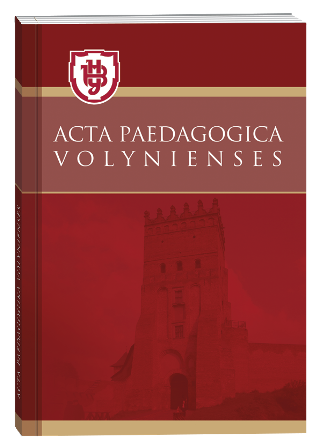LINGUISTIC PERSONALITY AS A MULTIDIMENSIONAL PHENOMENON IN MODERN SCIENTIFIC DISCOURSE
DOI:
https://doi.org/10.32782/apv/2025.1.34Keywords:
types of speech activity, stages of speech activity, mechanisms of discourse, speech personality, communicative personality, linguistic personality, linguistic personality of a future specialist in applied linguistics, students’ speech activity in linguistic disciplinesAbstract
The article substantiates the problem of forming the linguistic identity of future specialists in applied linguistics in the process of teaching linguistic disciplines, which is essential for modern higher pedagogical education. It is taken into account that it is inappropriate to consider all types of speech activity separately, since they are closely related psychologically and physiologically. However, in the educational process, one type of speech activity (speaking, listening, reading, or writing) may dominate, depending on the purpose and objectives of mastering the relevant topic of the lesson. It is stated that in the process of mastering linguistic disciplines at each stage of students’ speech activity, one or another type of perceptual or receptive speech activity is improved. Attention is focused on the peculiarities of the influence of each mechanism, in particular: 1) speaking mechanisms, which include reproduction, selection of a language unit, combination, construction, warning, and discourse; 2) for listening – mechanisms of perception, internal speech, comparison and recognition, logical understanding; 3) for reading – anticipation, guessing, logical understanding, and internal speech listening; 4) for writing – the same as for speaking, but focused on the visual analyser: correct transcoding of speech sounds into adequate writing signs, i.e. spelling. The study of the nodal aspects of the problem under investigation is based on two traditional positions in psychological science in the theoretical substantiation of speech mechanisms: the combining sounds into words and their pronunciation; the communicatively appropriate combination of words for expression, which are the basis of educational and speech activities. Since reproductive speech can be complete (reproduction without changing the form and content) or partial (involves the transfer of content in new forms), the identified type is defined as insufficiently effective for the speech development of future specialists in applied linguistics in the process of teaching linguistic disciplines and is characterised as playing a supporting role, making it possible to verbalise linguistic theory and illustrate it with specific examples in one’s own speech. Productive types of speech activity are defined as basic, since when speaking or writing, students reproduce words, language clichés, terms, grammatically correct statements on a conscious level; perform language experiments, observations, analyse their results; transform language units, fold them into a real word and expand them into a complex syntactic structure, and formulate appropriate conclusions. It has been observed that students’ activity in producing diverse statements, performing problematic tasks and creative tasks contributes to their multidirectional preparation for the successful performance of a sufficiently wide professional functionality (mastering the skills and abilities of compiling electronic dictionaries, developing alphabets and writing systems, transcribing oral speech and transliterating foreign language words, linguistically substantiating the principles, approaches, means of teaching Ukrainian and foreign languages, translating from one language into another, standardising and unifying of scientific and technical terminology, compiling special linguistic reference books, computer processing of natural language texts, etc.). We consider the linguistic personality of a future specialist in applied linguistics to be one who has a perfect command of the system of linguistic knowledge in Ukrainian and foreign languages, provides linguistic support for the operation of information systems, and reproduces linguistic activity in all spheres of social life, including professional life.
References
Бацевич Ф. С. Основи комунікативної лінгвістики. Київ : Академія, 2004. 344 с.
Богуш А. М., Трифонова О. С., Кисельова О. І., Горіна Ж. Д., Черкасов М. Л. Формування мовної особистості на різних вікових етапах : монографія. Одеса : ПНЦ АПН України, 2008. 272 с.
Голуб Н. Ознаки компетентності мовної особистості учня. Вісник Прикарпатського університету. 2003. № 1 (48). С. 45–52.
Голубовська І. О. Мовна особистість як лінгвокультурний феномен. Studia Linguistica. Київ : Видав.-поліграф. центр «Київський університет», 2008. Вип. 1. С. 25–33.
Горошкіна О. Лінгводидактичні засади навчання української мови в старших класах природничо-математичного профілю : монографія. Луганськ : Альма-матер, 2004. 362 с.
Груба Т. Інтегративна сутність мовної особистості у контексті нового змісту навчання української мови. Педагогіка вищої школи: методологія, теорія, технології, т. III. Київ : Педагогічна преса, 2010. № 3(38). С. 78‒83.
Загнітко А. Словник сучасної лінгвістики: поняття і терміни : у 4 т. Донецьк : ДонНУ, 2013. Т. 2. 350 с.
Загнітко А. Мовна особистість в епістолярному дискурсі: типологія лінгвоіндивідуацій і лінгвоіндивідуалізацій. Гуманітарна освіта у технічних вищих навчальних закладах. 2016. Вип. 33. С. 58–71.
Засєкіна Л. В. Мовна особистість у сучасному соціальному просторі. Соціальна психологія. № 5(25). 2007. С. 82–90.
Караман С. Упровадження педагогічних інновацій у теорію і практику професійної підготовки вчителя-словесника. Вісник Львівського університету. Серія філологічна. Львів, 2010. Випуск 50. С. 87–98.
Лазорко О. В. Відповідальність як соціальна детермінанта самопроектування професійного зростання менеджера. Вісник післядипломної освіти. 2010. Вип. 1(2). С. 217–224.
Мамчур Л. Формування мовної особистості в умовах реалізації Концепції «Нова українська школа». Академічна культура дослідника в освітньому просторі : збірник матеріалів міжнародної науково-практичної конференції (м. Суми, 17 травня2018 року) / за ред. О. М. Семеног. Суми : Видавництво СумДПУ ім. А. С. Макаренка, 2018. С.74‒78.
Мацько Л. І. Українська мова в освітньому просторі: навч. посіб. для студ.-філологів освітньо-кваліфікаційного рівня «магістр». Київ : НПУ імені М. П. Драгоманова, 2009. 607 с.
Потебня О. О. Естетика і поетика слова. Київ : Мистецтво, 1985. 302 с.
Пентилюк М. Формування мовної особистості учня – важлива проблема сучасної лінгводидактики. Проблеми формування мовної особистості учнів середніх загальноосвітніх закладів. Рівне : РЕГІ, 2006. С. 29–34.
Селіванова О. О. Сучасна лінгвістика: напрями та проблеми. Полтава : Довкілля-К., 2008. 712 с.
Словник-довідник з української лінгводидактики / за ред. М. Пентилюк. Київ : Ленвіт, 2015. 320 с.
Тернопільська В. І. Відповідальність особистості: гуманітарний аспект. Вісник Житомир. держ. ун-ту ім. І. Франка. 2004. № 14. С. 47–50.







